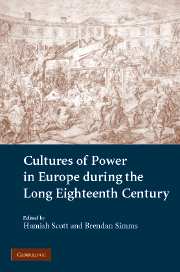Book contents
- Frontmatter
- Contents
- Preface
- List of contributors
- 1 Introduction: culture and power during the long eighteenth century
- 2 When culture meets power: the Prussian coronation of 1701
- 3 Military culture in the Reich, c. 1680–1806
- 4 Diplomatic culture in old regime Europe
- 5 Early eighteenth-century Britain as a confessional state
- 6 ‘Ministers of Europe’: British strategic culture, 1714–1760
- 7 Confessional power and the power of confession: concealing and revealing the faith in Alpine Salzburg, 1730–1734
- 8 The transformation of the Aufklärung: from the idea of power to the power of ideas
- 9 Culture and Bürgerlichkeit in eighteenth-century Germany
- 10 The politics of language and the languages of politics: Latin and the vernaculars in eighteenth-century Hungary
- 11 ‘Silence, respect obedience’: political culture in Louis XV's France
- 12 Joseph II, petitions and the public sphere
- 13 The court nobility and the origins of the French Revolution
- 14 The French Revolution and the abolition of nobility
- 15 Foreign policy and political culture in later eighteenth-century France
- 16 Power and patronage in Mozart's La clemenza di Tito and Die Zauberflöte
- 17 Between Louis and Ludwig: from the culture of French power to the power of German culture, c. 1789–1848
- Index
6 - ‘Ministers of Europe’: British strategic culture, 1714–1760
Published online by Cambridge University Press: 17 July 2009
- Frontmatter
- Contents
- Preface
- List of contributors
- 1 Introduction: culture and power during the long eighteenth century
- 2 When culture meets power: the Prussian coronation of 1701
- 3 Military culture in the Reich, c. 1680–1806
- 4 Diplomatic culture in old regime Europe
- 5 Early eighteenth-century Britain as a confessional state
- 6 ‘Ministers of Europe’: British strategic culture, 1714–1760
- 7 Confessional power and the power of confession: concealing and revealing the faith in Alpine Salzburg, 1730–1734
- 8 The transformation of the Aufklärung: from the idea of power to the power of ideas
- 9 Culture and Bürgerlichkeit in eighteenth-century Germany
- 10 The politics of language and the languages of politics: Latin and the vernaculars in eighteenth-century Hungary
- 11 ‘Silence, respect obedience’: political culture in Louis XV's France
- 12 Joseph II, petitions and the public sphere
- 13 The court nobility and the origins of the French Revolution
- 14 The French Revolution and the abolition of nobility
- 15 Foreign policy and political culture in later eighteenth-century France
- 16 Power and patronage in Mozart's La clemenza di Tito and Die Zauberflöte
- 17 Between Louis and Ludwig: from the culture of French power to the power of German culture, c. 1789–1848
- Index
Summary
During the past twenty years historians have once again begun to look at eighteenth-century British history in its European context. Much of the discussion centres on the question of whether or not eighteenth-century Britain was an ‘ancien régime’ on continental lines. There has also been important work on Britain's role in the European state system. Yet many historians remain reluctant to integrate the implications of Britain's great power status for their subject. Jonathan Clark, who first sparked the ‘ancien régime’ debate, pays very little attention to foreign policy, concentrating instead on high politics and religion. His second broadside, Revolution and Rebellion, included only a brief belated acknowledgement of its importance. This trend has been accentuated by the current historiographical preoccupation with the imperial dimension to eighteenth-century British history. Peter Marshall, for example, speaks of ‘a nation defined by empire’. Kathleen Wilson has written of a ‘sense of the people’ which was primarily imperial and colonial. Yet as one recent critic has noted, Wilson's very stimulating work makes virtually no reference to the ‘world of European politics’ within which the imperial themes she described were played out.
This is surprising, because the European balance of power, and Britain's position within it, rather than taxation, popular unrest, confession, elections or colonial expansion, was the central political preoccupation of eighteenth-century Britain. It was by far the largest single subject of debate in parliament.
- Type
- Chapter
- Information
- Cultures of Power in Europe during the Long Eighteenth Century , pp. 110 - 132Publisher: Cambridge University PressPrint publication year: 2007
- 3
- Cited by



